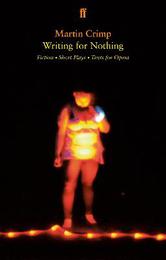
|
Writing for Nothing: Fiction, Short Plays, Texts for Opera
Paperback / softback
Main Details
| Title |
Writing for Nothing: Fiction, Short Plays, Texts for Opera
|
| Authors and Contributors |
By (author) Martin Crimp
|
| Physical Properties |
| Format:Paperback / softback | | Pages:240 | | Dimensions(mm): Height 197,Width 125 |
|
| Category/Genre | Plays, playscripts |
|---|
| ISBN/Barcode |
9780571354009
|
| Classifications | Dewey:822.914 |
|---|
| Audience | |
|---|
| Edition |
Main
|
|
Publishing Details |
| Publisher |
Faber & Faber
|
| Imprint |
Faber & Faber
|
| Publication Date |
17 January 2019 |
| Publication Country |
United Kingdom
|
Description
Martin Crimp's Writing for Nothing collects texts written over the last thirty years. Included here are short plays, unmistakably the work of the internationally acclaimed author of Attempts on Her Life; texts for opera, beginning with the modern masterpiece Written on Skin, created with composer George Benjamin; and two stories that provide a new perspective on Crimp, revealing a writer capable of bringing all of his brilliance to prose. Unsettling, elegant and incisive, Writing for Nothing is a vibrant and varied anthology, celebrating a writer with a rare talent for illuminating the power structures behind our everyday world.
Author Biography
Martin Crimp was born in 1956. His play Attempts on Her Life(1997) established his international reputation. His other work for theatre includes When We Have Sufficiently Tortured Each Other, Men Asleep, The Rest Will be Familiar to You from Cinema, In the Republic of Happiness, Play House, The City, Fewer Emergencies, Cruel and Tender, The Country, The Treatment, Getting Attention, No One Sees the Video, Play with Repeats, Dealing with Clair and Definitely the Bahamas. He is also the author of three texts, Into the Little Hill, Written on Skin and Lessons in Love and Violence, for operas by George Benjamin. His many translations of French plays include works by Genet, Ionesco, Koltes, Marivaux and Moliere.
Reviews"A fine example of Swiftian irony . . . devastatingly effective."--Guardian "Martin Crimp's distilled writing approaches that of Choderlos de Laclos: elegant and light in its description of the perverse."--Telerama
|